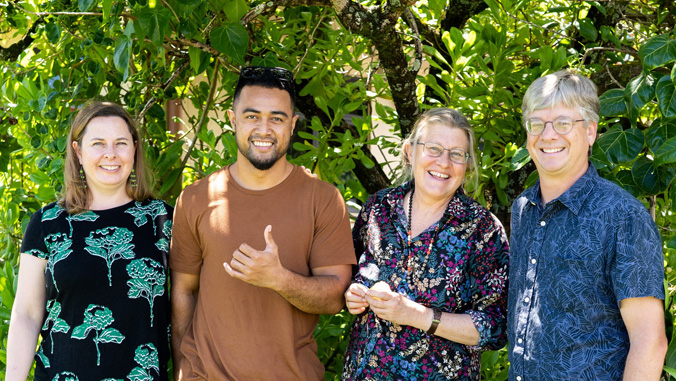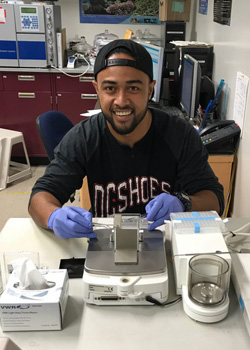
A graduate student at the University of Hawaiʻi at Hilo has been collecting data to assess nearshore water quality and its effect on coral reefs in the island state of Pohnpei, the capital of the Federated States of Micronesia (FSM). FSM is an island nation in the Western Pacific situated south of Guam and east of the Philippines.
Bryan Tonga, who is from Pohnpei and a graduate student in the tropical conservation biology and environmental science program, says he and his colleagues are evaluating sewage pollution using a multi-indicator approach.
“We are measuring salinity, turbidity, nutrients, nitrates and fecal indicator bacteria levels in the water,” Tonga explained. “We also sampled macroalgae for stable nitrogen isotopes and nitrogen content.”
“Bryan has collected the first nutrient samples from Micronesia ever,” said Tracy Wiegner, the director of the Analytical Laboratory at UH Hilo, where Tonga is analyzing his collected samples.
Managing the effects of climate change

Findings from Tonga’s research will contribute vital information to climate adaptation efforts in Pohnpei and other tropical Pacific island nations, allowing them to better manage coastal waters, improve water quality and reduce damage to coral reefs in the face of climate change in the region.
“We need to establish baseline water quality conditions because with climate change the water quality could shift dramatically,” said Wiegner, a water quality expert and marine science professor on Tonga’s thesis committee. “In Pohnpei, like here on the island of Hawaiʻi, a lot of houses use cesspools. With rising sea levels, they can become inundated with sea water and sewage can flow out to the nearshore reefs. Also, climate change could bring increased precipitation, which would mean increased land runoff to the shores and potential flooding of cesspools.”
Along with Wiegner, Tonga’s thesis work is being supervised by UH Hilo marine science professors Karla McDermid and Steven Colbert. McDermid, an expert in phycology, will help Tonga identify the macroalgal tissue samples since distinct species may take up nutrients from the ocean differently. Tonga has spent the past two summers in Micronesia collecting water and macroalgae samples from 31 stations around Pohnpei’s coastline, including both populated and pristine remote areas, which are difficult to reach due to the mangrove forests covering most of the island’s coast. His work is the first comprehensive documentation of the water quality conditions on Pohnpei’s coastline.
For more details, visit the UH Hilo Stories website.
—By Leah Sherwood, a graduate student in the tropical conservation biology and environmental science program at UH Hilo.

